Artificial intelligence has penetrated nearly every sector, and with its rapid development, it forces us to think about how to remain competitive in an ever-changing world. On this topic, Mediamax spoke with Thierry Burger-Helmchen, Professor of Innovation Management of the University of Strasbourg, who also lectures in the Pan-European Executive MBA program being conducted in Yerevan.
This educational program, jointly offered by the University of York’s European campus CITY College and the Faculty of Economics and Management at the University of Strasbourg, provides Armenian applicants with the opportunity to receive high-quality British and European education and two MBA diplomas from York and Strasbourg Universities, while continuing to live, work, and study in Armenia.
In our conversation with Professor Thierry Bourger-Helmchen, we discussed the use of artificial intelligence tools in the educational process and how high-quality education teaches the development of qualities that are unique to humans and cannot be replicated by man-made machines.
- Professor, I would like to begin our conversation with a fundamental question: What is the core purpose of education? I believe that mentioning this is important for an appropriate response and adaptation of the sector in light of the rapid changes occurring in the world.
- For me, the general purpose of education is to provide individuals with the knowledge and competences for understanding a particular situation. That situation could be the world in general, which is the focus of general education and higher education at the university level as well. Then, depending on your field of specialization, education will give you specific knowledge and tools that you have to master.
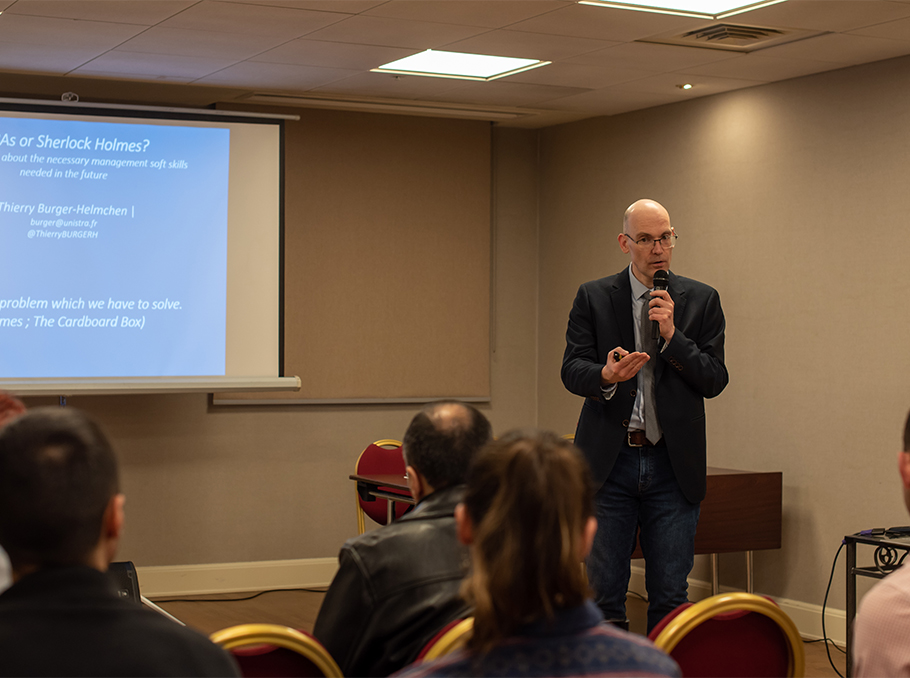
Photo: Mediamax
So depending on the level you are fixing your attention, education will be giving you all knowledge and competences to understand the environment you are in and in a more specialized way give you the knowledge and tools to master a specific task.
- We now have entirely new tools, such as various systems powered by artificial intelligence, and we can see that AI has fully penetrated educational and work environments. What skills should a person have in order to use AI correctly? Also, what potential risks do you see in the excessive use of AI, particularly in education?
- This question is tricky, and it is important to highlight why. Each of us uses AI differently, depending on our background knowledge. I received an education that involved a lot of pen-and-paper work, whereas the new generation's education is much more computer-oriented. As a result, our knowledge and skills in using AI, the way we formulate questions, and how we interpret AI-generated responses all vary significantly.
AI is clearly a tool, but to use it correctly, one must have the ability to read and understand information accurately. Although its usage may seem simple, effectively engaging with AI requires prior knowledge. Without it, one may misinterpret the system’s response or fail to recognize suspicious elements. A person must be able to critically assess the answer and ultimately verify it—this is the main challenge.

Photo: Mediamax
This leads directly to the second part of your question: what are the risks? The main risk is blindly trusting AI-generated answers without distinguishing between accurate, partially correct, or entirely false information. This is a challenge we face with our students today.
- Can we conclude that people who have received a high-quality education and have strong foundational knowledge are able to successfully use AI tools for their development and career growth while significantly saving time and energy? On the other hand, the use of the same tools might be disruptive and even potentially dangerous for those who lack a solid education.
- Absolutely! I believe that, like many other computer programs, AI is exceptionally good at performing complex but repetitive tasks that can be easily broken down into smaller subtasks. When prompted with such tasks, ChatGPT or other language-based AI models provide fairly good answers.
However, the challenge arises with their ability to generate new content, which is not trustful. Nevertheless, many students tend to trust these answers too easily.
- There is an opinion that with the emergence of these new tools, the importance of formal education is diminishing. This may be understandable when we talk about low-quality educational institutions that only provide information without sufficient practice and shared experience. What continues to remain important in the case of high-quality formal education?
- The critical thinking that is necessary for using these tools correctly can only be developed through a high-quality education, along with specialized training and a lot of practice in very specific fields.
Anyone can get answers from AI, so why should you be the one to get the job? What is your added value? What will you bring to the company or society in general? This is where critical thinking comes into play.
Another aspect is that, in many situations—especially in business or negotiation—interactions are human-to-human. You cannot pause the conversation and check with AI; you need to bring your own knowledge.
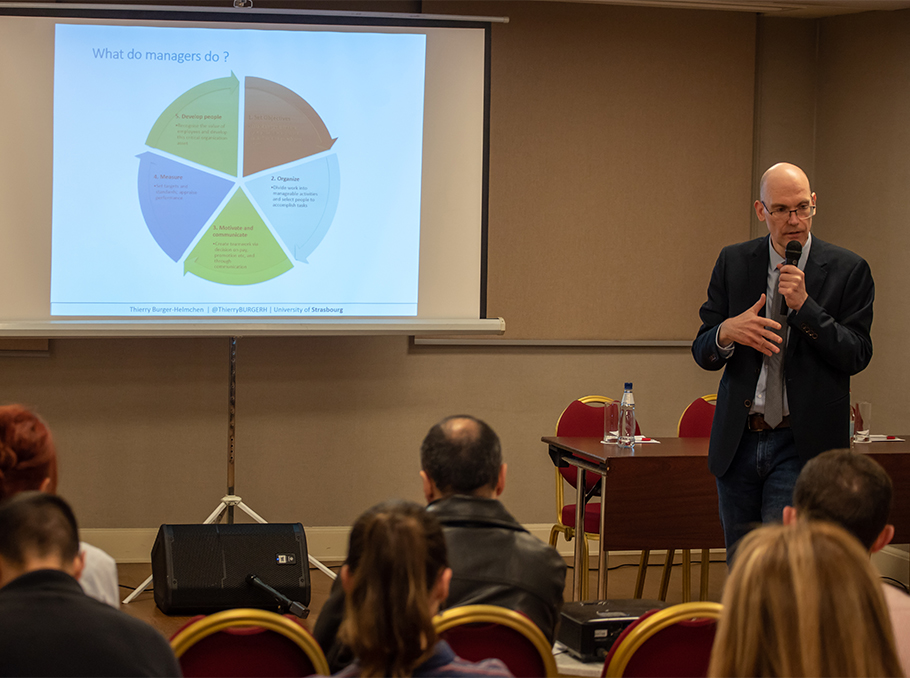
Photo: Mediamax
What I believe will suffer most are the middle-range quality roles and education. On the other hand, those at the upper levels will increasingly need deep, specialized knowledge in specific domains. They need to be super experts in a specific field and that would be their added value.
- The fear of being replaced by AI is becoming more common. What can professionals do to escape that?
- First of all, in the short term, they will not be replaced by AI. They will be replaced by someone using AI more effectively than they are.
Over the longer term, it is clear that a number of professional activities will change significantly. Many new activities and tasks will emerge—tasks that you are not doing today simply because we lack the time and resources.
Probably not only the company business model, but also the economic organization of our society will have to change, but that is a very wide debate.
- On the one hand, we see that artificial intelligence, as you also mentioned, is very good at performing these repetitive tasks. At the same time, by observing the work of these tools more closely, it is possible to notice the associative connections that lead to this or that result. The human mind also operates through associative connections, however, human being is capable of overcoming them and seeing beyond. In contrast, artificial intelligence cannot think outside of these connections, as that is the mechanism of its operation. How can people develop the abilities that are unique to humans and cannot be inherent to machines?
- I completely agree with your perspective on AI and how it functions. At its core, AI operates on probability. When generating a word, it predicts the next one based on the highest probability of association. AI is a highly routinized system, and even its creativity is built on routine.

Photo: Mediamax
As humans, we are also highly routinized, but with the right training, we develop the ability to recognize the right moment to be creative. AI, on the other hand, cannot do this. It is either super routinized or it is randomly creative, but it lacks the ability to determine when a particular context requires strict adherence to routine and when it calls for creativity.
To develop this human capability, students in high-quality education must first master the fundamentals thoroughly. Even if they do not use certain routines daily in their jobs, knowing them inside out allows them to recognize the right moment—during a process, discussion, or interaction—when they can stand out and do things differently.
Even the most creative people are not different all the time on everything: they just find a right time and place to use their knowledge differently to do a specific activity in a specific way.
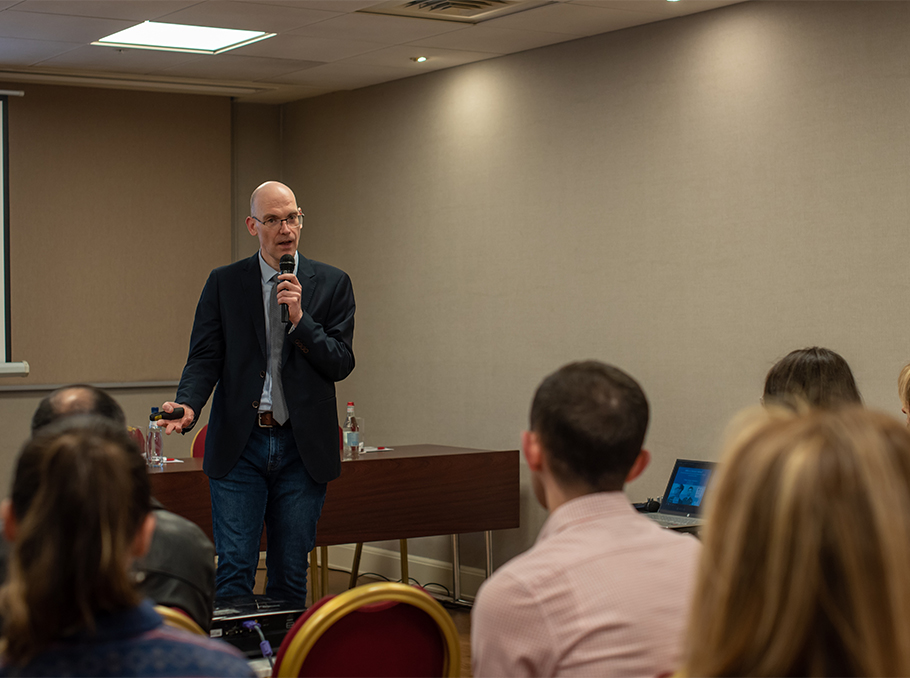
The same principle applies to education, particularly for MBA students. A strong foundation enables them to grasp all the essentials, and in their specific field, they must develop the awareness to sense the right moment for creativity.
- You mentioned AI's creativity. Is it really capable of being creative today?
- It depends on what you mean by creativity. If creativity means producing something radically new, then yes, AI can be considered creative because it can generate random connections between concepts and words, inevitably leading to new outcomes. However, creativity is not just about novelty—it also needs to be useful in a specific context. AI, however, cannot assess that usefulness; only a human can determine whether something is not only new but also relevant and applicable to a particular situation.
- That is great news.
- And I believe it will remain this way for some time.
- How is the role of the educator changing in this new reality?
- A large part of our job remains the same: guiding students in understanding what is correct and what is not. As for AI, it is a tool we need to train students to use effectively. Many exercises now incorporate AI, and we know students will use it. They may be clumsy with the tool, and sometimes they make mistakes in how they present their answers. Our role is to point out when using AI is helpful, how it can be helpful, and when it is not useful at all.
- Could you please share some examples from your classes during the Pan-European Executive MBA program?
- In my classes, there are exercises that start with the basics, where students must rely on pen and paper and their own minds, with no other tools. After that I allow them to use the internet to gather data. Finally, they are allowed to use AI tools of their choice. In the end, we compare the three answers and often find that the most traditional, mid-level solutions come from AI. It provides average answer that is acceptable, but the teams that excel are those that take the time to think by themselves—what can they expect, what might be different, and where can they tweak the system to improve it?
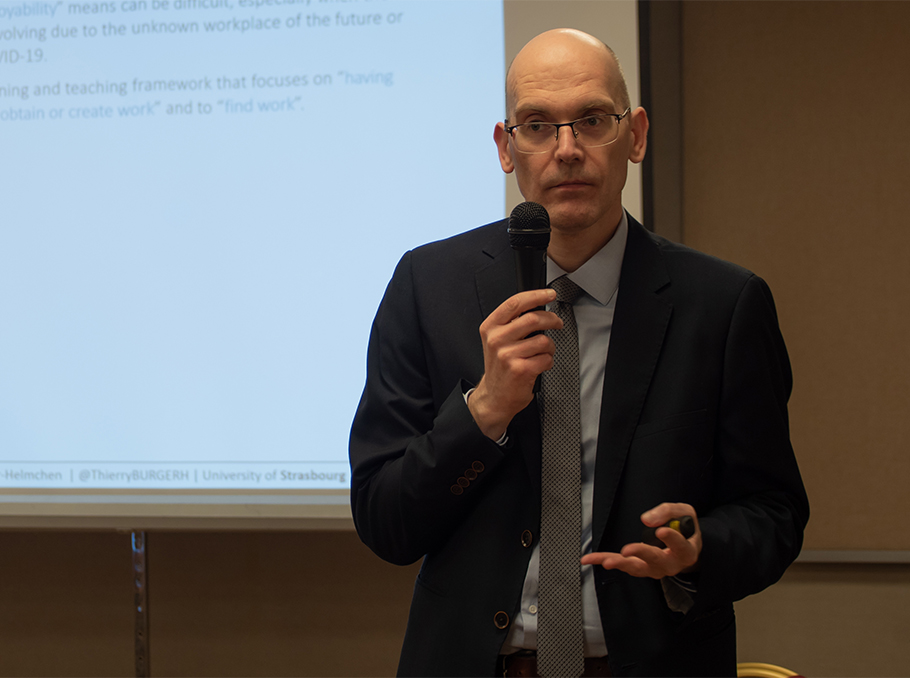
Photo: Mediamax
We design exercises and interactions where they go through all three steps in different orders, depending on the task. This helps them understand when the machine performs better than they do and when they can make a difference.
I teach strategic management, and one of the challenges I give to my students is understanding how a competitor’s business model works. If you ask ChatGPT or another AI about this, you will get an answer for sure. The trick is how trustworthy that answer is, and what data the machine has used to come up with it. I tell my students that while the machine’s answer may be correct, they should consider: if they had to design a better business model than what the machine suggested, where would they make changes?
If you ask ChatGPT what the most important thing is in a business model, it will give you a different answer each time. In creative thinking exercises like this, AI lacks consistency, and that is where my students make a difference.
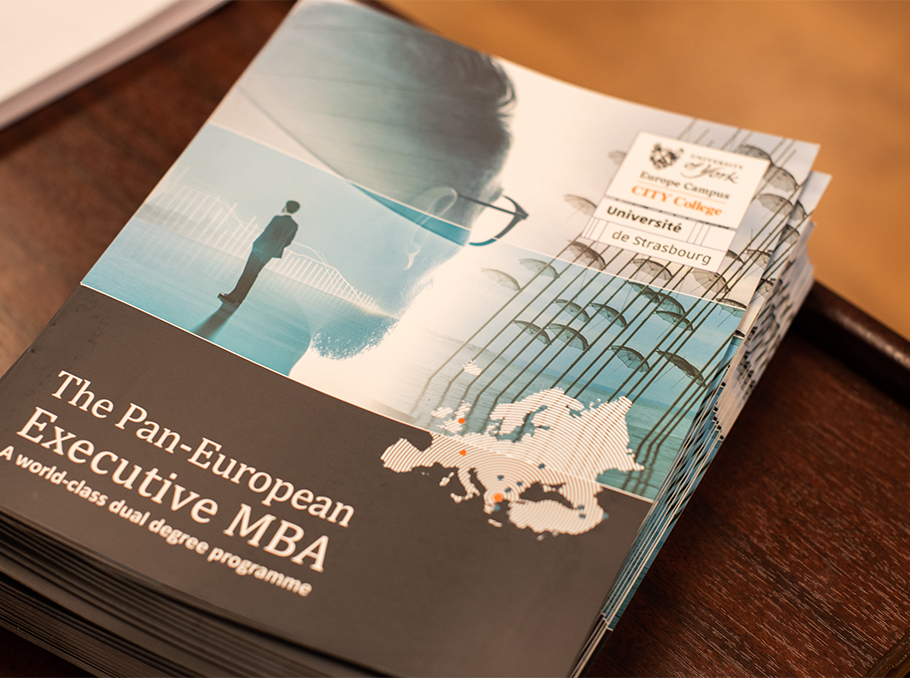
Photo: Mediamax
AI pushes the students to ask deeper, more advanced questions, as they can already get the answers for simple ones from the machine. That is when the real discussion happens in class, and that is what I enjoy most about working with my students.
- What are the other advantages of the Executive MBA program you offer compared to others?
- More and more, an MBA is becoming a standard qualification, with numerous competing schools offering it to everyone. Our program, however, requires significant previous professional experience, and the average age of students in our classes is higher than in most other MBA programs. This brings value to discussions in two ways: first, it means students have more experience and a broader perspective to present; second, it means they often have deep knowledge about specific situations. Our job as teachers is to help them understand what works in various situations, what can be generalized, and what is specific to certain companies or countries. It is a key moment when even the most experienced students realize that some things they thought were effective may not be as universally applicable as they assumed.
Another aspect I enjoy is the business trips, where students visit different places and interact with people they might never have encountered otherwise. These experiences, even if cultural differences are not huge, challenge students to adapt the environment and engage professionally.

Photo: Mediamax
What I particularly like about our Pan-European MBA is its structure: in the first year, students cover the basics that is essential for having common knowledge that allows them to discuss business issues with people from around the world. In the second year, students choose a specialization, allowing them to become experts in one domain.
The most exciting part for me is the MBA thesis, which is a feature not found in all MBA programs. Here, students have the freedom to choose their topic and dive deeply into it. They spend many hours with teachers as coaches or mentors, focusing on a specific area. These three elements—general knowledge, expertise, and in-depth study-make a real difference in the MBA experience.
- Who would you recommend applying to this program?
- Our program is ideal for professionals who are currently working in an organization and feel they are missing something. This could be in terms of management skills or a deeper understanding of the business and economic environment. It could also be the ambition to reach higher positions within their company or improve workplace processes, as well as transition into a different sector. I am confident that individuals in these three categories will gain valuable knowledge and skills through our program.
Gaiane Yenokian spoke with Professor Burger-Helmchen









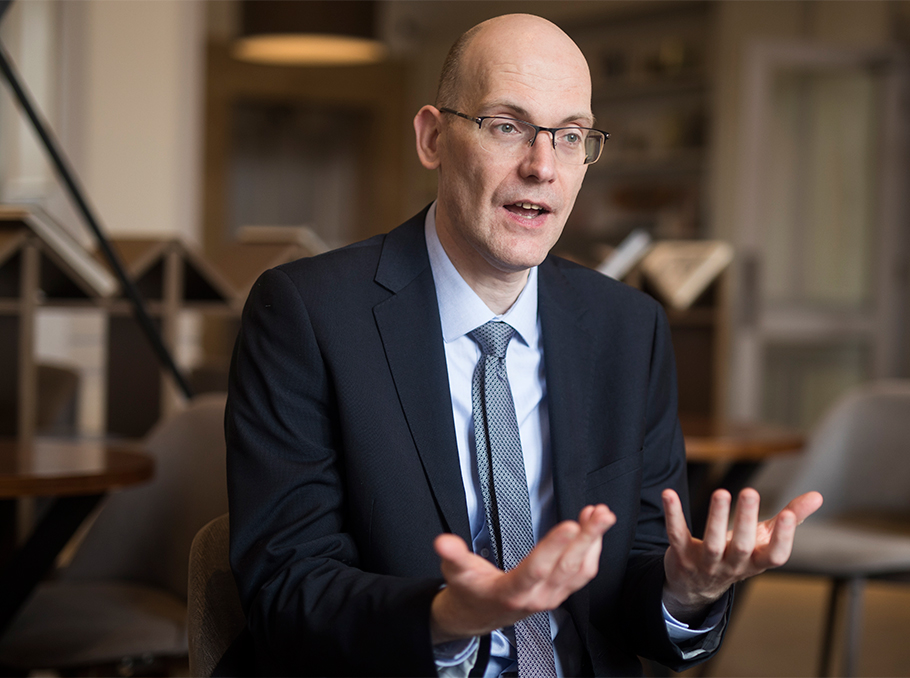






Comments
Dear visitors, You can place your opinion on the material using your Facebook account. Please, be polite and follow our simple rules: you are not allowed to make off - topic comments, place advertisements, use abusive and filthy language. The editorial staff reserves the right to moderate and delete comments in case of breach of the rules.